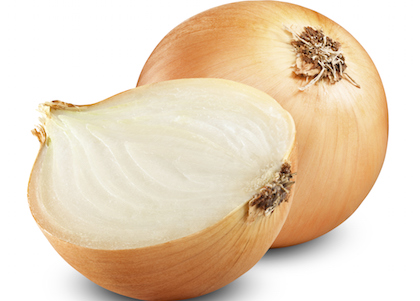
Anti-Cancer Foods: Onions
By Joel Fuhrman MD
The Allium family of vegetables, which includes onions, garlic, leeks, shallots, and scallions, are rich in flavonoids and phenols, which have anti-inflammatory properties and are protective against heart disease, diabetes, and cancer. White onions are not as nutritious as yellow and red, and shallots have the most polyphenols of the whole group.
Flavonoids are a class of antioxidant molecules with subcategories including isoflavones, flavonols, catechins, and anthocyanins among others. All of these flavonoids have been attributed health-promoting properties. Red onions contain at least 25 different anthocyanins, and the predominant flavonoid in all onions is quercetin. Quercetin slows tumor development, suppresses growth and proliferation and causes cell death in colon cancer cells. In short, flavonoids such as quercetin can contribute to preventing damaged cells from advancing to cancer. Flavonoids also have anti-inflammatory effects that may contribute to cancer prevention.
Epidemiological studies have found that increased consumption of Allium vegetables is associated with decreased risk of several cancers. For example, one large European study found striking risk reductions in the participants who consumed the greatest quantities of onions or garlic for oral, esophageal, colorectal, laryngeal, breast, ovarian, and prostate cancers. A 55-80 percent reduction of almost all major cancers. Amazing!
In addition to flavonoids, Allium vegetables are also rich in cancer-fighting organosulfur compounds, which are produced when the cell walls of the vegetables are broken down by chopping, crushing, or chewing. These compounds are thought to be mostly responsible for the cancer-protective effects of Allium vegetables. In scientific studies, organosulfur compounds prevent the development of cancers by detoxifying carcinogens, halting cancer cell growth, and preventing tumors from obtaining a blood supply.
To read more about the anti-cancer effects of onions, garlic and their family members, read my newest book Super Immunity.
Vegetables from the Allium family can be added to any and every vegetable dish for flavor. As mentioned above, allium vegetables must be chopped before eating or cooking to initiate the chemical reaction that forms the protective sulfur compounds. When you cut onions and your eyes begin to tear, they are creating the sulfur compounds that protect against cancer.
Here are some tips for cutting an onion to maximize anti-cancer compounds and minimize eye irritation:
• Make sure that the onion is cold before you cut it. Even putting the onion in the freezer for 5 minutes is sufficient.
• You can use a fan to blow the gaseous compounds away from you if you like.
• The root is the part of the onion with the highest concentration of these compounds – we want those sulfur compounds in our dish, so we want to use as much of the root as we can.
• Cut the end of the root off with the root facing away from you, preserving as much of the root as possible.
• Make sure to then cut or chop the onion finely, slice thinly, or put it in a food processor before adding to your soup, salad, or vegetable dish to maximize the production of sulfur compounds.
References:
1 – Br J Nutr. 2008 May;99 E Suppl 1:ES53-9.
2 – J Agric Food Chem. 2007 Dec 12;55(25):10067-80.
3 – Chem Biol Interact. 2010 Jan 27;183(2):276-83.
4 – Cancer Invest. 2009 Jul;27(6):604-12.
5 – Cancer Lett. 2009 Aug 28;281(2):162-70.
6 – Clin Nutr. 2010 Feb;29(1):42-46.
7 – Am J Clin Nutr. 2006 Nov;84(5):1027-32.
8 – Cancer Lett. 2008 Oct 8;269(2):305-14.